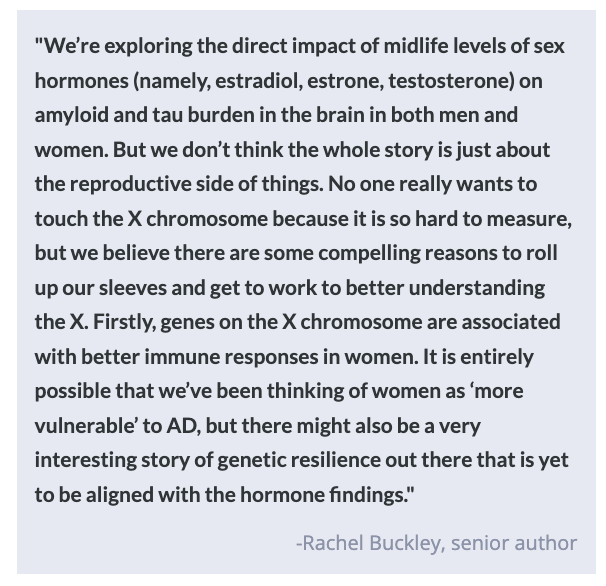Later Initiation of Hormone Therapy after Menopause Increases Alzheimer's Disease Risk
Post by Kulpreet Cheema
The takeaway
Women who experience menopause at an earlier age or started hormone therapy later have elevated tau levels in the brain, which worsens in the presence of beta-amyloid plaques.
What's the science?
The two hallmarks of Alzheimer's disease (AD) pathology in the brain are the presence of neurofibrillary tangles of tau protein and plaques made of beta-amyloid protein. Research has shown that females have greater levels of tau tangles than males. These differences can be attributed to sex-related risk factors like early onset of menopause and the use of hormone treatment (HT). HT has been suggested as one of the treatments to mitigate cognitive impairment and manage menopausal symptoms like hot flashes, night pain, and urinary issues. However, clinical trials have found evidence suggesting that starting HT after menopause is associated with an increased risk of developing dementia.
This week in JAMA Neurology, Coughlan and colleagues sought to investigate the relationship between the onset of menopause, age at HT initiation, and Alzheimer’s disease-related pathology in the brain.
How did they do it?
Two hundred ninety-two cognitively unimpaired participants (193 females and 99 males) enrolled in the Wisconsin Registry for Alzheimer's Prevention study were selected for the study. Demographic data (like the age of menopause onset and HT use), lifestyle factors (like education level, menopause severity, and history of hysterectomy), and cognitive performance scores (memory and executive function) were collected. In addition, two specialized Positron Emission Tomography (PET) scans were performed to detect tau tangles and amyloid-beta deposition in parietal, temporal, and occipital brain regions. Linear regression models were run to study the association between sex, age of menopause, and HT use with regional tau and beta-amyloid plaque levels.
What did they find?
Higher levels of cortical tau in parietal and temporal brain regions were found in females than in males, worsened with the presence of beta-amyloid plaques. Precisely in females, younger age at menopause onset, and use of HT post-menopause were associated with high tau deposition. When HT was initiated more than five years after menopause onset, tau levels were significantly higher compared to females who started their HT closer to their menopause age. Finally, cognitive performance was lower in females with late initiation of HT compared to females with earlier initiation of HT. All these results suggest that late initiation of HT can explain the association between HT use and increased levels of tau protein in cognitively unimpaired women.
What's the impact?
Females have an elevated risk of developing dementia due to sex-related factors including the age of menopause and treatment with HT. This study adds to the recommendation of administering HT closer to the menopause onset rather than later. This finding is significant as it can help inform the discussions around hormone-based treatments and AD risk in women.


